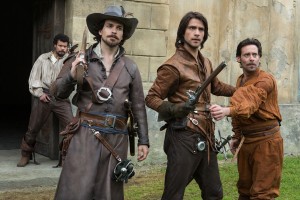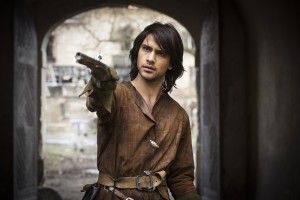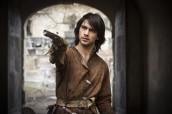
Howard Charles is Porthos, Santiago Cabrera is Aramis and Luke Pasqualino is D’Artagnan in THE MUSKETEERS | ©2014 BBC America/Larry Horricks
Jessica Pope is one of the executive producers of THE MUSKETEERS. This latest take on Alexandre Dumas’ tale of loyalty and adventure in seventeenth-century France star Luke Pasqualino as D’Artagnan, Tom Burke as Athos, Santiago Cabrera as Aramis and Howard Charles as Porthos, with Peter Capaldi as their Season 1 adversary Cardinal Richelieu.
THE MUSKETEERS debuted its first two seasons in the U.S. on BBC America, but its third and final season debuted on Hulu, where all seasons are now available. Pope (whose other credits include DALZIEL & PASCOE, THE STATE WITHIN and SENSE AND SENSIBILITY) talks about making MUSKETEERS, moving to Hulu – and what happened when Capaldi, the current Doctor Who, traded his cathedral for the TARDIS.
ASSIGNMENT X: Does the Brexit affect your production situation at all?
JESSICA POPE: No [laughs]. I mean, not really, because we’d done filming anyway by the time that all happened. But it wouldn’t have done anyway, because filming in the Czech Republic, we were there for production reasons, not financial reasons.
AX: You’ve made three seasons of MUSKETEERS. Will there be a fourth?
POPE: No, we’ve finished. That’s it. Three seasons. So we’ve done thirty hours, the first two seasons for BBC America, third season for Hulu, and that’s the whole story tied up, finished.
AX: How many sets of show runners have you had?
POPE: Two. So we’ve had Adrian Hodges, who created the original series and developed the show, and then we had two of the writers from Series 2, Simon Allen and Simon J. Ashford, who took on Series 3.
AX: Was THE MUSKETEERS story something that you were particularly fond of before you got involved in it, or did you become fond of it once you became involved in the show?
POPE: A little bit of both. I read the book when I was a child. I hadn’t gone back to it as an adult, and I was asked to exec produce it by the BBC, and I fell in love with it all over again, because it’s about heroes, and it’s about being the best person you can be, standing up for things. We’re in a tough world at the moment, and I think THE MUSKETEERS is a very optimistic, very heroic feel-good brand. So in a way, it’s TV that’s very mainstream, but that can draw you to your couch, sit you in front of the TV, and you say, “I’m going to have a good time for an hour with some great character actors.”
AX: Speaking of great character actors, were you planning to lose your Season 1 villain Richelieu, played by Peter Capaldi, at the end of Season 1?
POPE: Well, the actor moved, which made us then think about it. We hadn’t planned to lose him. But you know, it turned out to be a positive thing, because what we then did was to make it a motif of each season. So every season, we said, “Let’s have a big new bad.” So it meant that we had a much greater pool of star actors to choose from, because as you know, if you’re a very top of the line actor, you don’t really want to sign yourself up for season after season. So if you go to a top actor and say, “It’s one season, you’re the star of the series in terms of the baddie,” we had a lot of actors to choose from. So yeah, it was a shock, but it turned out to actually be very beneficial for the show.

Luke Pasqualino is D’Artagnan in THE MUSKETEERS | ©2014 BBC America/Larry Horricks
AX: Who is your Season 3 villain?
POPE: Rupert Everett. He plays a character called the Marquis de Feron, who is the bastard brother of Louis the Thirteenth. Totally fictitious, he never existed, but that’s our story.
AX: Besides that, any historical interesting things where you had to make choices between fact and what worked for the show?
POPE: Yeah. Interesting, because Peter left us in Season 1, Richelieu was still alive when the King died in truth. We’d lost Richelieu in Season 1, so by the time we had Louis die in Season 3, Richelieu was also dead. So that wasn’t historically accurate, but we couldn’t do anything about that [laughs]. I had a fantasy at one point where we would ask the DOCTOR WHO series to come and land in 1630 Paris. I think it would be great fun.
AX: Did that just come out of the blue, or did you get some warning that, “You know, you might not have Peter Capaldi for Season 2, because they’d like him to be the Doctor”?
POPE: No, it came out of the blue, because it’s a very top-secret thing. When they change Doctors, it’s really a big deal. We knew nothing about it. We got a slight heads-up, because twenty-four hours before it was announced publicly that he was the next Doctor, we had him in to do ADR, which is Additional Dialogue Recording, in the edit suite, and my producer rang me and said, “Oh, God, I think we’re in trouble.” And I said, “Why?” “Because Peter’s just come into the studio, and he’s shaved off his beard.” [laughs] So that was a clue. We thought, “Oh, something’s up.” And then two days later, we heard he was Doctor Who. But it was amazing for him.
AX: If you hadn’t already, did you then lock everybody else into their contracts in blood or something?
POPE: They were all locked in – everybody else apart from him was all locked in. They already couldn’t go.
AX: Apart from the villain situation, what were the big changes for you in terms of making the show from Seasons 1, 2 and 3?
POPE: I don’t think there were any big changes, because we built a set in Season 1 out in Doksany in the Czech Republic. So by the time Season 3 came along, we were very comfortable on the set, we knew the locations, the actors were very comfortable with each other. I think, if anything, the big change was that we got more ambitious with the show. Because we did know what we were doing, and it was running like clockwork, we just pushed everything that bit further. We thought, “Okay, let’s make the stunts bigger, let’s make the fights harder, let’s make the whole ambition of the show go up a notch.”
AX: And did the actors playing the Musketeers get more into it as things went on, or did they start saying, “Oh, my God, I’m so tired”?
POPE: Oh, no, they loved it. They were so sad when it finished. And by the end of Season 3, they had become really spectacularly good stuntmen and horsemen. Things that they were learning in Season 1, they were absolutely proficient at in Season 3. Which also meant that we could challenge them to do more.
AX: Did BBC America and Hulu give you different kinds of input?
POPE: I don’t really get any of that. I think what I was really very happy with, when Hulu came on board, was the idea that – we had thirty hours of television by the time we finished the show – if you’re a fan of the show, you can watch all of it in one hit. You can sit down, you can stream the series. It’s not the old-fashioned way of watching television, which is an episode, and then you have to wait a week to get the next episode. I think it’s a really immersive experience that Hulu is delivering, because you can get the entire three seasons in one go.
AX: And with non-streaming television, normally you have to wait between seasons. So do you think that people will enjoy being able to watch all three seasons together?
POPE: I hope so. I know as a viewer myself, if I’m really into something, I want to watch as much of it as I can. So I think it’s about commitment, I think it’s about finding a show that you like, and then really immersing yourself in it, getting a sort of epic experience, really. I think it’s the future. I think it’s certainly how my daughter is watching television. Her generation doesn’t want to wait. They want to engage with the series on a big platform. And that’s something that Hulu is providing. So it’s a modern way of watching television.
AX: Did you live-Tweet or do anything on social media to interact with the fans?
POPE: Oh, God, yeah, all the time. When the last show was going out in the U.K., I was watching it obviously for the hundredth time, but I was also watching the Twitter feed. And people were really sad. It was very moving for me as a producer to see how much the show affected its audience and how much they loved it. I mean, it was a genuine affection for the fact that it had given something to them and it was over.
AX: Did THE MUSKETEERS change tonally between Seasons 2 and 3, either because you had different show runners, or just because the Musketeers by then were in a lot more trouble with the monarchy, et al?
POPE: It didn’t really. I think it got a little bit darker, a little more adult, but not in any huge way. I mean, ultimately THE MUSKETEERS is an optimistic, romantic brand. People think of it as a family piece of entertainment. So I think we made it modern, and I think we made it fresh, but I don’t we did anything ultimately very different with what people expected the characters to be.
AX: And during the three seasons, what were some of your bigger production challenges? Building a castle …?
POPE: Funnily enough, the castles, the palaces, the monasteries, all of the major locations, they’re all there for free, because they were built in the seventeenth century or the twelfth century. That was the easy bit. The difficulties were the stunt work. So we bought this huge green-screen ravine zip wire for Season 2, and an underwater tunnel, which we did in a swimming pool, and then we had to fill the pool with water and have the actors swim through it. So there was a lot of challenging stunt work to do. But the set design was pretty much set from Season 1, and we had this huge set out in Doksany, which is just outside Prague. We had a standing set there. So the production challenges were really physical, rather than location or anything else.
AX: What’s been your favorite part of working on THE MUSKETEERS?
POPE: The ambition of it, really, the scale of it. Action-adventure is a very interesting genre for television. It’s common in movies. It’s not that common on TV, because it’s expensive and it takes a lot of time. So going into that genre for the first time, seeing how ambitious you could be, challenging the directors, the actors, the writers – writers for television are very adept at dialogue, but don’t often do action. So that was really new for me, but fabulous.
AX: And what would you most like to be asked about your experience on THE MUSKETEERS?
POPE: Oh, my goodness. I think the thing that I want to express, really, is just the joy of doing the show for such an incredibly loyal fan base. We’ve had huge support from the viewers, more so than any other show I’ve worked on, and that’s a real fuel to you as a producer, when you know that your audience is really loving your show, cheering you on. Because it is a heroic drama, and so I’ve loved engaging with the audience in a really direct way, through social media, and seeing them love what we’ve made for them.
This interview was conducted during Hulu’s portion of the Television Critics Association press tour.
Follow us on Twitter at ASSIGNMENT X
Like us on Facebook at ASSIGNMENT X
Article Source: Assignment X
Article: THE MUSKETEERS: EP Jessica Pope on Season 3 – exclusive interview
Related Posts:











